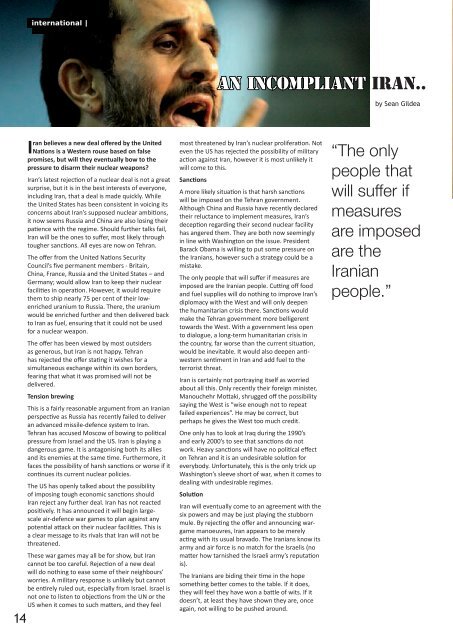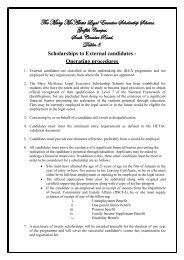Create successful ePaper yourself
Turn your PDF publications into a flip-book with our unique Google optimized e-Paper software.
international |<br />
IrelandÕ s<br />
ireland |<br />
An incompliant Iran..<br />
by Sean Gildea<br />
Condom<br />
Iran believes a new deal offered by the United<br />
Nations is a Western rouse based on false<br />
promises, but will they eventually bow <strong>to</strong> the<br />
pressure <strong>to</strong> disarm their nuclear weapons<br />
Iran’s latest rejection of a nuclear deal is not a great<br />
surprise, but it is in the best interests of everyone,<br />
including Iran, that a deal is made quickly. While<br />
the United States has been consistent in voicing its<br />
concerns about Iran’s supposed nuclear ambitions,<br />
it now seems Russia and China are also losing their<br />
patience with the regime. Should further talks fail,<br />
Iran will be the ones <strong>to</strong> suffer, most likely through<br />
<strong>to</strong>ugher sanctions. All eyes are now on Tehran.<br />
The offer from the United Nations Security<br />
Council’s five permanent members - Britain,<br />
China, France, Russia and the United States – and<br />
Germany; would allow Iran <strong>to</strong> keep their nuclear<br />
facilities in operation. However, it would require<br />
them <strong>to</strong> ship nearly 75 per cent of their lowenriched<br />
uranium <strong>to</strong> Russia. There, the uranium<br />
would be enriched further and then delivered back<br />
<strong>to</strong> Iran as fuel, ensuring that it could not be used<br />
for a nuclear weapon.<br />
The offer has been viewed by most outsiders<br />
as generous, but Iran is not happy. Tehran<br />
has rejected the offer stating it wishes for a<br />
simultaneous exchange within its own borders,<br />
fearing that what it was promised will not be<br />
delivered.<br />
Tension brewing<br />
This is a fairly reasonable argument from an Iranian<br />
perspective as Russia has recently failed <strong>to</strong> deliver<br />
an advanced missile-defence system <strong>to</strong> Iran.<br />
Tehran has accused Moscow of bowing <strong>to</strong> political<br />
pressure from Israel and the US. Iran is playing a<br />
dangerous game. It is antagonising both its allies<br />
and its enemies at the same time. Furthermore, it<br />
faces the possibility of harsh sanctions or worse if it<br />
continues its current nuclear policies.<br />
The US has openly talked about the possibility<br />
of imposing <strong>to</strong>ugh economic sanctions should<br />
Iran reject any further deal. Iran has not reacted<br />
positively. It has announced it will begin largescale<br />
air-defence war games <strong>to</strong> plan against any<br />
potential attack on their nuclear facilities. This is<br />
a clear message <strong>to</strong> its rivals that Iran will not be<br />
threatened.<br />
These war games may all be for show, but Iran<br />
cannot be <strong>to</strong>o careful. Rejection of a new deal<br />
will do nothing <strong>to</strong> ease some of their neighbours’<br />
worries. A military response is unlikely but cannot<br />
be entirely ruled out, especially from Israel. Israel is<br />
not one <strong>to</strong> listen <strong>to</strong> objections from the UN or the<br />
US when it comes <strong>to</strong> such matters, and they feel<br />
most threatened by Iran’s nuclear proliferation. Not<br />
even the US has rejected the possibility of military<br />
action against Iran, however it is most unlikely it<br />
will come <strong>to</strong> this.<br />
Sanctions<br />
A more likely situation is that harsh sanctions<br />
will be imposed on the Tehran government.<br />
Although China and Russia have recently declared<br />
their reluctance <strong>to</strong> implement measures, Iran’s<br />
deception regarding their second nuclear facility<br />
has angered them. They are both now seemingly<br />
in line with Washing<strong>to</strong>n on the issue. President<br />
Barack Obama is willing <strong>to</strong> put some pressure on<br />
the Iranians, however such a strategy could be a<br />
mistake.<br />
The only people that will suffer if measures are<br />
imposed are the Iranian people. Cutting off food<br />
and fuel supplies will do nothing <strong>to</strong> improve Iran’s<br />
diplomacy with the West and will only deepen<br />
the humanitarian crisis there. Sanctions would<br />
make the Tehran government more belligerent<br />
<strong>to</strong>wards the West. With a government less open<br />
<strong>to</strong> dialogue, a long-term humanitarian crisis in<br />
the country, far worse than the current situation,<br />
would be inevitable. It would also deepen antiwestern<br />
sentiment in Iran and add fuel <strong>to</strong> the<br />
terrorist threat.<br />
Iran is certainly not portraying itself as worried<br />
about all this. Only recently their foreign minister,<br />
Manouchehr Mottaki, shrugged off the possibility<br />
saying the West is “wise enough not <strong>to</strong> repeat<br />
failed experiences”. He may be correct, but<br />
perhaps he gives the West <strong>to</strong>o much credit.<br />
One only has <strong>to</strong> look at Iraq during the 1990’s<br />
and early 2000’s <strong>to</strong> see that sanctions do not<br />
work. Heavy sanctions will have no political effect<br />
on Tehran and it is an undesirable solution for<br />
everybody. Unfortunately, this is the only trick up<br />
Washing<strong>to</strong>n’s sleeve short of war, when it comes <strong>to</strong><br />
dealing with undesirable regimes.<br />
Solution<br />
Iran will eventually come <strong>to</strong> an agreement with the<br />
six powers and may be just playing the stubborn<br />
mule. By rejecting the offer and announcing wargame<br />
manoeuvres, Iran appears <strong>to</strong> be merely<br />
acting with its usual bravado. The Iranians know its<br />
army and air force is no match for the Israelis (no<br />
matter how tarnished the Israeli army’s reputation<br />
is).<br />
The Iranians are biding their time in the hope<br />
something better comes <strong>to</strong> the table. If it does,<br />
they will feel they have won a battle of wits. If it<br />
doesn’t, at least they have shown they are, once<br />
again, not willing <strong>to</strong> be pushed around.<br />
“The only<br />
people that<br />
will suffer if<br />
measures<br />
are imposed<br />
are the<br />
Iranian<br />
people.”<br />
The World Health Organisation (WHO)<br />
classifies condoms as “only contraceptive<br />
method proven <strong>to</strong> reduce the risk of all<br />
sexually transmitted infections (STIs),<br />
including HIV.”<br />
Yet in Ireland, as usual, we are being grossly<br />
overcharged for these life-saving items.<br />
Condoms are taxed as “luxury goods” in this<br />
country, even though they protect people<br />
from such damaging diseases and unplanned<br />
pregnancies. According <strong>to</strong> the Health Service<br />
Executive (HSE), 337 new HIV infections were<br />
detected in 2006, up over 6% on 2005.<br />
Such “goods” face a steep rate of VAT. In<br />
February 2008, former Finance Minister,<br />
Brian Cowen, announced a VAT rate cut on<br />
condoms from 21% <strong>to</strong> 13.5%, there was<br />
widespread support for the move. The<br />
reduction meant that condoms were reduced<br />
by just over a Euro <strong>to</strong> around €10 for a packet<br />
of 12. Other forms of contraception such as<br />
the “pill” have a 0% VAT rate, why is there a<br />
difference<br />
Under EU regulations, member states are<br />
only allowed <strong>to</strong> drop VAT rates <strong>to</strong> no less<br />
than 5% on certain goods, as set out in the<br />
Annex III of the EU VAT Directive. Condoms<br />
are included in this Directive. Brian Cowen<br />
said: “the position is that the VAT rating of<br />
all goods and services are subject <strong>to</strong> the<br />
requirement of EU VAT law with which Irish<br />
VAT law must comply.”<br />
Ò Durex Ireland believe<br />
people should not be<br />
Ô taxedÕ for protecting<br />
their sexual health.Ó<br />
Yet the then Minister could have dropped the<br />
VAT rate on condoms from 21% <strong>to</strong> 5% under<br />
EU law, but didn’t.<br />
Rip-Off<br />
By David Clax<strong>to</strong>n<br />
In 2006, then British Chancellor, Gordon<br />
Brown, was able <strong>to</strong> drop the VAT rate on<br />
condoms from 17.5% <strong>to</strong> 5%. This helped <strong>to</strong><br />
reduce condom prices <strong>to</strong> around €6 in the<br />
UK.<br />
There is a widespread belief that consumers<br />
are being ripped off from various sources<br />
concerned with this issue.<br />
Ò we are being grossly<br />
overcharged for lifesaving<br />
items with<br />
condoms being taxed as<br />
Ò luxury goodsÕ Ó<br />
Durex Ireland has said that they “believe<br />
people should not be ‘taxed’ for protecting<br />
their sexual health.” The company also states<br />
that condoms should not be classified as a<br />
luxury item and that VAT should be cut <strong>to</strong> 5%.<br />
“By supporting the reduction in VAT levied on<br />
condoms, Durex believes a lower price will<br />
make condoms more accessible, particularly<br />
<strong>to</strong> young people for whom price could be an<br />
issue,” said a spokesperson for the company.<br />
The Union of Students in Ireland (USI)<br />
President Hamidreza Khodabakhshi said:<br />
“let’s be clear, the Government hasn’t gone<br />
far enough in reducing the cost of condoms.<br />
The USI continues <strong>to</strong> lobby for a further<br />
reduction in VAT <strong>to</strong> 5% as provided for by EU<br />
law.”<br />
For Proinsias De Rossa, Labour Member<br />
of the European Parliament (MEP) and<br />
party member of the Socialist Group, it is<br />
clear what is happening in this country. He<br />
said: “We are being ripped off by condom<br />
suppliers. There seems <strong>to</strong> be reluctance for<br />
consumers <strong>to</strong> complain.”<br />
Is the VAT rate the sole cause of Irish people<br />
being overcharged for condoms The VAT<br />
rate in Spain is 16% and they are charged<br />
over €6 for a 12 pack of condoms. The same<br />
pack has a rate of 21% VAT in Belgium, yet<br />
costs over €3. While in France, at 19.6% it<br />
costs over €4 and in Germany, at 19% costs<br />
over €5 for the same pack. The standard<br />
rates of VAT in these countries are all<br />
different <strong>to</strong> Ireland’s, some higher, some<br />
lower, but we pay €12 for the same pack of<br />
condoms that is much cheaper in other EU<br />
states.<br />
Durex Ireland says, “As a manufacturer, we<br />
have no control over retail costs, nor are we<br />
allowed <strong>to</strong> control them in any way under<br />
EU legislation.” “Prices for condoms are<br />
set by the retailers themselves,” a Durex<br />
spokesperson said.<br />
Labour would “insist that the Competition<br />
Authority would examine the prices charged<br />
by companies <strong>to</strong> establish if there is an anticompetitive<br />
price fixing cartel, or market<br />
sharing arrangement in place by major<br />
manufacturers,” according <strong>to</strong> Proinsias De<br />
Rossa. “The Government don’t want <strong>to</strong><br />
arouse the ire of conservative elements<br />
in Irish society, who prefer <strong>to</strong> see young<br />
people risk their health and lives thank forego<br />
a religious based objective <strong>to</strong> so-called<br />
‘artificial’ contraception,” concluded De<br />
Rossa.<br />
No one, it seems, wants <strong>to</strong> admit any fault<br />
in prices being so high. This is clearly a<br />
health and safety issue. Considering that<br />
HIV infections are rising, this is another case<br />
of the government passing the buck on an<br />
urgent issue. Does this surprise anyone at all<br />
these days<br />
14 15

















